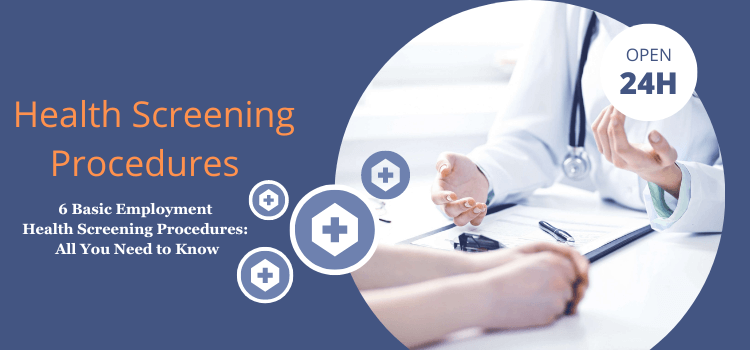
When applying for a job, you may have encountered the term “pre employment health screening.” This process plays a vital role in the hiring process for many companies. But what exactly is it, and why do employers use it? This article will explore the basics of pre-employment health screening, including its purpose, legal requirements, and common procedures. Understanding these procedures will help you navigate the process more effectively whether you’re a job seeker or an employer.
Why do companies use pre-employment health screening?
Pre-employment health screening serves multiple purposes for companies. First and foremost, it helps employers assess job applicants’ overall health and fitness. This evaluation is crucial, especially for positions that require physical exertion or expose employees to potentially hazardous environments. By conducting health screenings, companies can ensure that candidates are physically capable of performing their job duties safely and effectively.
Additionally, pre-employment health screening helps employers identify any existing health conditions that may affect job performance or pose a risk to workplace safety. By uncovering such conditions early on, employers can take appropriate measures to provide necessary accommodations or adjustments to support the employee in their role.
Legal requirements for pre-employment health screenings
It’s essential to note that pre-employment health screenings must adhere to legal requirements to ensure fairness and compliance. While these requirements vary by jurisdiction and industry, employers must respect privacy laws and anti-discrimination regulations.
Typically, employers are allowed to request specific health information relevant to the job requirements. However, they are prohibited from conducting health screenings that invade an individual’s privacy or discriminate against candidates based on their health status. Employers must familiarize themselves with local laws and consult legal professionals to ensure compliance.
Tips for preparing for your job health screening
If you are scheduled for a pre-employment health screening, feeling a bit nervous is natural. However, with a little preparation, you can confidently approach the process. Here are a few tips to help you get ready:
- Research the requirements: Familiarize yourself with the specific health screening procedures and tests that may be conducted. Understanding what to expect can help alleviate anxiety.
- Get a good night’s sleep: Prioritize rest and ensure you are well-rested before the screening. This will help you feel more alert and focused during the process.
- Bring relevant documents: Be prepared to provide any necessary documents or medical records requested by the employer. This may include vaccination records, medical history, or other relevant information.
- Dress comfortably: Wear comfortable clothing that allows easy access to different body parts for examination or testing. This will facilitate the process and make you feel more at ease.
- Communicate openly: If you have any concerns or questions about the screening, don’t hesitate to communicate with the healthcare professional conducting the tests. They are there to help and provide the necessary guidance.
Pre-employment health screening methods
Pre-employment health screenings involve various methods and tests to provide employers with a comprehensive understanding of an applicant’s health status. Here is a more detailed explanation of the common procedures you may encounter during a pre-employment health screening:
- Medical History Questionnaires: Medical history questionnaires are essential to the screening process. These questionnaires collect detailed information about your medical background, including previous illnesses, surgeries, allergies, and current medications. Employers use this information to assess your health status and identify potential risks or limitations.
- Physical Examination: A thorough physical examination is typically conducted during pre-employment health screening. A healthcare professional will measure your height, weight, and blood pressure during this examination. They may also conduct a general assessment of your physical well-being, such as checking your heart and lung functions, examining your musculoskeletal system, and assessing your overall physical fitness. This examination helps identify any existing health issues or limitations that may impact your ability to perform certain job duties.
- Vision Test: A vision test is a common component of pre-employment health screenings, especially for jobs that require good visual acuity. During this test, you may be asked to read an eye chart to assess your distance and near vision. The healthcare professional may also perform additional tests, such as assessing color vision or conducting a visual field test, to identify potential vision problems affecting your job performance.
- Immunization Tests: Some employers may require proof of immunizations to protect employees against certain communicable diseases. As part of the pre-employment health screening, you may be asked to provide vaccination records or undergo blood tests to determine your immunity to specific diseases. This helps employers maintain a healthy and safe working environment by protecting employees against preventable illnesses.
- Heart Health: Depending on the nature of the job, employers may include tests related to heart health in the screening process. These tests are particularly relevant for positions that involve physically demanding activities or jobs with a potential risk of cardiovascular strain. One common test is an electrocardiogram (ECG), which evaluates your heart’s electrical activity to detect any abnormalities or signs of heart disease. Employers may also conduct stress tests, which involve monitoring your heart’s response to physical exertion, to assess your cardiovascular fitness and overall heart health.
- Mental Health Tests: In some cases, employers may incorporate mental health assessments into the pre-employment health screening. These assessments aim to identify any potential mental health conditions that may impact job performance or workplace safety. The tests may involve questionnaires or interviews conducted by a qualified mental health professional to evaluate your psychological well-being, emotional stability, and ability to handle work-related stressors.
Pre-employment health screening plays a crucial role in the hiring process for many companies. Employers can make informed decisions regarding job suitability and ensure workplace safety by assessing an applicant’s overall health and fitness. As a job seeker, understanding the purpose and procedures of pre-employment health screenings can help you confidently navigate the process. Prepare accordingly, familiarize yourself with legal requirements, and communicate openly with the healthcare professionals conducting the screenings. By doing so, you can approach the process positively and increase your chances of success in landing the right job.






Leave a Reply